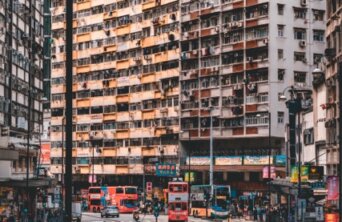- About
- Topics
- Picks
- Audio
- Story
- In-Depth
- Opinion
- News
- Donate
-
Signup for our newsletterOur Editors' Best Picks.Send
Read, Debate: Engage.
| topic: | Climate Change |
|---|---|
| located: | Hong Kong |
| editor: | Vanesse Chan |
In Hong Kong, extreme weather is taking a significant toll on the poor. The city sweltered in its hottest summer and battled “once-in-a-century” rain this year. Some less privileged residents in the subdivided flats or cage homes face challenges at home, such as water leaking inside the flat and a higher risk of heat-related illnesses, all intensified by climate change.
Low-income groups with no choice but to live in such cramped cubicles and often in poor conditions have to bear the extreme heat without sound ventilation systems or air conditioners at home. The bad weather may also worsen their health, increasing the medical bills that they can barely afford.
According to UNICEF, “climate justice” protects the most vulnerable groups from climate change, as some are more susceptible to loss and damage due to inequalities.
More than 210,000 people live in subdivided flats, of which the majority are female and more than 10 per cent are elderly, according to the Hong Kong Census and Statistics Department report in August this year.
NGOs CarbonCare InnoLab and Society for Community Organization (SoCO) are working to push for a change in housing policy to help the poor cope with climate-induced challenges.
CarbonCare InnoLab is a civic group dedicated to innovative solutions to climate change. It promotes discussions on “just transitions” among various sectors of society through dialogues. It aims for a fair and inclusive approach for considering different stakeholders.
The non-profit published the “Hong Kong Just Transition Report” in December 2022, prompting various official departments to act accordingly and solve the housing problems escalated by climate change. The NGO believes dialogue is the initial step for solving the decade-long, deeply rooted housing problem.
Society for Community Organization (SoCO) is also offering support to the community. Established in 1972, the group is dedicated to relieving poverty and advocating for civic rights. SoCO’s social workers regularly visit the subdivided flats where they distribute necessities to people, talk to them, and understand their needs.
SoCO surveyed almost 400 people living in the subdivided flats between May and June. The research explores challenges faced by residents, including high electricity costs and deteriorating living conditions. When asked about suggestions to improve the conditions, around two-thirds of the interviewees stated the authority could provide subsidies on heat prevention products like fans. One-third hoped for the construction of a community area where people can take a break.
SoCO also urged the government to speed up its public housing arrangement and step up rent control. Although organisations like SoCO can provide material and mental support, the residents still have to live in these tiny flats where rent and living qualities are not regulated.
The government announced its intention to shorten the waiting time for public housing from 6 years to 4.5 years in its 2022 policy address and create more supply, it has often been criticised for not being progressive and overlooking usable land resources like brownfield sites.
The NGOs are putting in the work and policymakers must now respond accordingly and initiate meaningful and genuine dialogues with these vulnerable communities.
Image by Joel Fulgencio.

